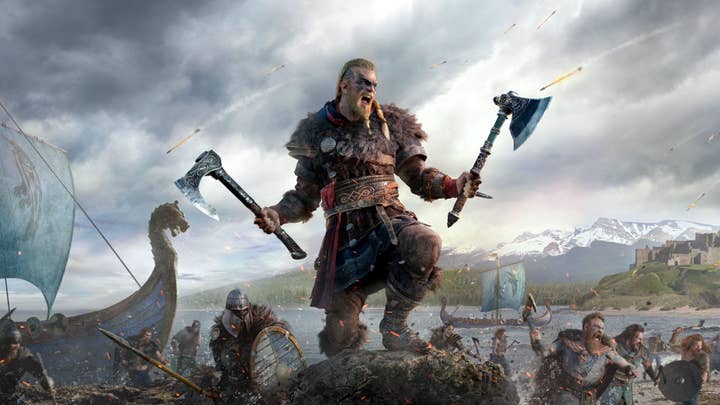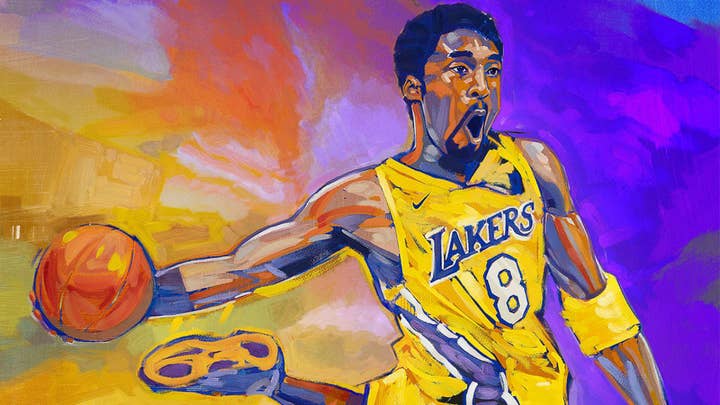Could Sony stumble on cross-generation games? | Opinion
If Sony tries to charge for PS5 versions of late-gen PS4 hits, comparisons with Microsoft's consumer-friendly strategy will be harsh
This year's next-gen console launches are shaping up to be one of the most interesting hardware transitions the industry has seen -- not because of any specifically revolutionary features of the hardware itself, but simply because it's the first time in a long while that we've had two great-looking, fully viable systems, representing quite different ideas about the future of the industry, going head-to-head with one another. Three, in fact, if we factor in Nintendo's Switch being in a pretty great place both commercially and creatively, even as Sony and Microsoft prepare their next-gen devices for launch.
There are a number of areas in which the future visions of PlayStation 5 and Xbox Series X diverge, and there are still key details of both companies' plans which have yet to be revealed. So while it's notable and refreshing that neither firm has tripped over its own shoelaces yet -- as one or the other had done by this point in the process leading up to the last two generational transitions -- there's still plenty of time for that to happen.
If there's one as-yet unannounced detail that's likely to trigger a backlash, it's probably pricing; one company's offering being vastly more expensive than the other would give them a very rough start indeed. The other area where the ground is uneven and full of tripping hazards, though, is cross-generation games -- and while we've had some information, most notably from Microsoft, that's helped to make sense of how cross-generation titles will be handled, there are still some really vital details we're missing, and plenty of opportunities for companies to suddenly find themselves cast as the villain of a story in which they'd planned to be the hero.
"The first year of the PS4's life was defined by titles which had been upgraded from late-era PS3 games"
Cross-generation titles have been a part of console transitions pretty much from the PlayStation 2 onwards, but they became a much bigger deal in the transition from the Xbox 360 generation to the PS4 generation. Whether because of development timelines or simple commercial incentives, at the outset of the current generation a very large part of the experience of early adopters in the first year of the PS4's life was defined by titles which had been upgraded from late-era PS3 games. The same scenario is likely to play out in 2021; much as we'd love to focus more heavily on exclusives that really use the possibilities of the new hardware, the reality is that a lot of the biggest early titles on PS5 and XSX are going to be upgraded versions of familiar favourites.
That naturally sets up a conflict between two competing sets of interests, both of them entirely legitimate. The consumers, who really don't want to have to buy the same game again just to play it on their new hardware, and the publishers, who want to create revenue with re-releases while they line up the next-gen exclusives that will carry them through subsequent years.
The platform holders are stuck in the middle to some extent; they'd far prefer to see consumers incentivised to buy next-gen hardware by the lure of playing existing games in higher quality, but they also need to keep publishers happy as much as possible. That's a situation doubly complicated for a company like Sony, of course, which is not just a platform holder but also one of the biggest publishers on its own platform.

This conflict between competing interests isn't new, but it's exacerbated quite a bit by factors unique to the generational transition we're about to go through. This is going to be the first generation shift with a really high degree of backwards compatibility right out of the gate. We've yet to see final confirmation on Sony's approach, but right now it seems likely that almost all major titles for both existing consoles are going to work fine on their successor hardware. Xbox Series X is even promising fairly significant graphical fidelity upgrades for existing Xbox One titles just by running them on the new console.
"This is going to be the first generation shift with a really high degree of backwards compatibility right out of the gate"
That obviously changes the calculus regarding a cross-generation release. Unless the upgrades in the next-gen version are extremely significant, it's going to be hard to justify asking users to pay again for a game they already own and can play -- in moderately lower fidelity -- on the same hardware. This gets even more problematic when you consider that in some previous generational leaps, the increased graphical fidelity and asset quality of the next-gen title was offset by a reduction in the amount of content on offer -- lots of games over the years have been heavily stripped-down in their initial next-gen offering compared to the lavishness of their late-generation offerings on older hardware. That's going to be hard to justify when the older game is still perfectly playable on the new console.
We're seeing something of a melange of different approaches proposed to address these problems and clarify the situation for consumers. Microsoft's Smart Delivery is undoubtedly the most promising and straightforward from the consumer's standpoint -- every game which is signed up to this program is innately dual-platform, so when an Xbox One user upgrades to XSX they'll be seamlessly upgraded to the next-gen version with all of their progress in the game and so on remaining intact.
While ideal for consumers, though, some publishers are obviously less keen on Smart Delivery. EA has announced that it'll do much the same thing but prefers to do so through its own version of the system, called "Dual Entitlement", which will work on both XSX and PS5. 2K Games, on the other hand, has announced that it'll launch NBA 2K21 in a two-game package that costs significantly more than the single-game version but includes both current-gen and next-gen versions -- choosing a middle ground which gives some discount to users who move between generations but refuses to eschew the cross-generation revenue entirely.
"Microsoft has made its position on first-party titles crystal clear -- all of them are Smart Delivery games"
It's a little hard to see how that's going to play out. It probably wouldn't work for a "core" title, but I accept the argument that sports titles have their own business logic to some degree. Still, it's worth noting that 2K is bundling a ton of extra content in that edition as well as both versions of the game, so they clearly understand that the value proposition has to be a bit better than just "pay a fair bit more money to get the next-gen version too."
As is apparent from the divergent approaches taken by EA and 2K, Microsoft isn't enforcing Smart Delivery as a blanket policy across Xbox titles, but the details of how much latitude publishers have to implement their own ideas for cross-generation games are still being fleshed out a little. It seems, for example, that selling the next-gen upgrade as a DLC will be verboten, but offering a store discount to owners of the previous-gen version will be okay. By and large, though, we know what Microsoft is doing. Most importantly, it's made its position on first-party titles crystal clear -- all of them are Smart Delivery games that'll work across both generations of hardware.

Sony's position is less clear, though to some extent that's simply because the company doesn't seem to be establishing quite as many rules for publishers in this regard. It doesn't have a Smart Delivery type program and is essentially leaving it down to publishers to figure out what they want to do with cross-generation games. The actual technical aspects of Smart Delivery, however, in terms of having a game that you buy once and can play the appropriate version on each generation of hardware, appears to be possible on Sony's platform -- it's simply that the company isn't branding this or pushing publishers to adopt it.
"First and foremost we need to see what Sony's first-party policy on cross-generation titles is going to look like"
From a consumer standpoint that's a little disappointing, but ultimately the effect might be the same. Microsoft is pushing Smart Delivery but allowing publishers to opt out, while Sony isn't pushing any equivalent but publishers can take that approach if they want. The results will likely meet in the middle, since it's unlikely that a publisher offering a free upgrade on Xbox Series X will try to charge for an equivalent upgrade on PS5.
The really big missing piece of the puzzle is what Sony's strategy is going to be with its own first-party titles. Nothing is announced yet, but it's hard to believe that there isn't a PS5 version of The Last of Us 2 or Ghost of Tsushima in the works; huge late-gen titles like that beg to be playable on next-gen hardware as well. The multi-million dollar question is whether those will be rolled out as free cross-gen upgrades for owners of the existing PS4 game, or whether they'll be sold as new versions. Sony may not even have made a final decision on that internally, of course. Having done very well from sales of upgraded games like The Last of Us at the previous console transition, the firm would no doubt like to repeat that by selling PS5 versions of its recent hits, but will also be aware that Microsoft's decision to make all of its cross-gen title upgrades free puts it in a very tricky spot in terms of public perception.
There are other routes the company can explore, of course; Spider-Man: Miles Morales is one interesting approach, putting a desirable expansion of a much-loved PS4 blockbuster into a box and selling it as a slightly cut-price PS5 exclusive. Adding enough new content to justify a lower-price purchase isn't as straightforward as just launching an upgraded PS5 version -- especially if assets and code were created from the outset with a next-gen upgrade in mind -- but from a consumer standpoint it's much more palatable than trying to sell a nicer-graphics version of a game they've already played. How well that approach could translate to other games, of course, is another question entirely.
Finally, Sony's situation is complicated further by the existence of the digital-only version of the PS5, which presents a problem for upgrades from physical versions of PS4 titles. EA has already run into this problem and won't be able to offer its "Dual Entitlement" scheme to digital PS5 owners, as it relies on your PS4 disc being in the drive to check that you're entitled to launch the PS5 version. This is a pretty hard limitation, and while the number of users it will impact is arguably small -- if you've got a bunch of physical PS4 games then you're probably going to buy the disc version of the PS5 so you can play your back catalogue titles, after all -- it does pose a strong argument for Sony creating some kind of stop-gap system to prevent leaving some users in the lurch.
Speculating on accomplishing that -- a system for distributing single-use digital codes with physical games, perhaps? -- is putting the cart before the horse, though. First and foremost we need to see what Sony's first-party policy on cross-generation titles is going to look like. If it's too major a departure from Microsoft's consumer-friendly approach, we could be looking at the first genuine stumble on the part of either of these companies in the next-gen race.

